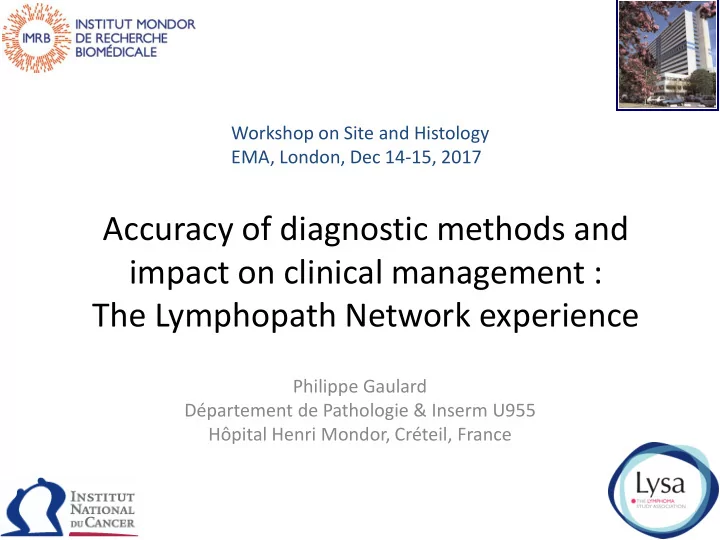

Workshop on Site and Histology EMA, London, Dec 14-15, 2017 Accuracy of diagnostic methods and impact on clinical management : The Lymphopath Network experience Philippe Gaulard Département de Pathologie & Inserm U955 Hôpital Henri Mondor, Créteil, France
Lymphomas: the French experience … • LYSA : - multicentric clinical group in 2012 (merging of former GELA & GOELAMS groups) - LYSA-pathology : clinical trials based on histological subtypes - ~only 10-15% of lymphoma patients • LYMPHOPATH : - pathology network for all lymphoma patients - labelled by INCa (NCI) • Molecular platforms : - performing molecular theranostic tests (solid tumours,....) - labelled by INCa (NCI)
Background • More than 80 lymphoma entities in the WHO 2017classification • Lymphoma diagnosis is challenging: expertise, ancillary tools • An accurate diagnosis is critical for the clinical management of lymphoma patients • A few rather “limited” studies (in USA and in UK) have report ed a variable discordance rate (6-28%) between referral and expert lymphoma diagnosis and a variable impact on patient care (2-17%) Lymphopath 2010 (INCa) : Realtime expert review of any newly diagnosed or suspected lymphomas Improve the clinical management of patients Lymphoma epidemiology Facilitate research studies on lymphomas (LYSA) Wilkins SB . J Clin Pathol 2011; Jaffe ES. JCO 2014 Lester BHJ 2003; Manion Am J surg Pathol 2008;LaCasce JCO 200; Proctor JCO 2011; Matasar Ann Oncol 2012;Bowen BJH 2014
Lymphopath network • Review of any newly or suspected lymphoma diagnosis 30-33 expert sites (University hospitals, by an expert hematopathologist Comprehensive cancer centres) - 42145 samples received during 2010-2013 period - 79754 cases (67621 lymphomas), 2010-2016 • Expert pathologists with unlimited access to ancillary techniques • Database recording both referral and expert diagnosis • Rate of diagnostic changes («concordance/discordance»): - % of submitted referral diagnosis confirmed or not by expert - cases sent for validation/cases sent for expertise • Major or minor changes classified by clinician according to their potential impact on clinical management
Decision algorithm – Classification of the main categories of mature non-cutaneous lymphomas by expert sites
Main lymphomas categories in France (2010-2013) (42145 Samples, 36920 mature lymphomas) Non-cutaneous lymphomas (n=32568)
Flowchart of the Lymphopath Study (2010-2013)
Lymphopath : overal diagnostic changes, 19.7% (°) 4289 pts submitted without diagnosis are excluded
Lymphopath : overal diagnostic changes, 19.7% Patients sent with provisional diagnosis but seeking expert second opinion n=19112, 37.8% Patients sent with formal diagnosis n= 12798, 3.7% (°°) (°) 4289 pts submitted without diagnosis are excluded (°°) ~8% when internal cases are excluded Quality control 319 randomly selected cases among expert sites: 99.05% concordance
Changes in cases with submitted diagnosis Types of discordances : Misclassification of lymphoma subtype 41.3% Main lymphoma category misclassification 36.6% Major discordances Unclassified to classified lymphoma Benign proliferation versus lymphoma 7.4% 3% Lymphoma versus another neoplasm lymphoma subtype misclassification without 11.7% Minor discordances change on patient care
Schematic representation of the rates of concordances and changes between 31910 referral and expert diagnoses
Conclusions 1. Review of 67,829 newly diagnosed lymphoma cases (2010 to 2015) 2. Confirmation of the initial diagnosis in ~80% of the patients 3. Estimated clinical impact in ~17% of lymphoma patients 4. Response time : 8 days 5. Acces of every patient to specialized techniques when needed 6. Training of pathologists and clinician involved in the management of the patients (diagnostic algorythms, meetings, website,….) 7. Unique lymphoma database in France: useful for research studies health monitoring: Exemple of the Bi-ALCL 8. Ongoing: - evaluation of the referral labs/pathologists, « easy » situations - medico-economic evaluation - molecular assessment: introduction of new biomarkers, ex: RT3 - clinical annotations : « real life » patients (REALYSA project)
Lymphopath : advantages & limits Pro Cons • C linical impact ( clinical • Not all cases (~80%?) trials, real life data, • No clinical annotations biomarkers…) • Very unequal activity in the • Absence of financial concern expert sites, difficulty to between pathologists manage this increased • All pathology labs (480) activity in a difficult context • Solve the pb of 2d opinion • « Feeling » from (some) referral pathologists • Epidemiological survey • Probably cost-effective • The patients..! • Health monitoring: Bi-ALCL..!
Acknowledgments Lymphopath experts/consortium Philippe Gaulard, Georges Delsol, Pierre Brousset C. Copie- Bergman, J Moroch, N. Ortonne, J. Briere, V. Meignin, T. Molina, N. Brousse, D. Canioni, S, Fraitag, D. Damotte, A. Carlotti, B. Fabiani, JF Fléjou, F. Charlotte, E. Labouyrie, A. Martin, A. Levy, J. Bosq, P. Dartigues, L. Lamant, V. Costes Martineau, T. Rousset, A. de Mascarel, M. Parrens, B. Vergier, I. Soubeyran, F. Berger, A. Traverse-Glehen, B. Balme, C. Chassagne-Clément, A.Valérie Decouvelaere, A. Fouchardière, B. Fabre, M. Peoc’h, A. Ledoux-Pilon, P. Dechelotte, F. Franck, L. Xerri , L. Mescam, JF. Michiels, I. Peyrotte, O. Vire, B. Chetaille, M. Benchetrit, A. Moreau, C. Bossard, MC. Rousselet, A. Croué, P. Tas, F. Arbion, A. de Muret, I. Quintin-Roué, MC. Copin, B. Bouchindhomme, C. Delattre, H. Sevestre, JM. Picquenot, A. François, P. Courville, F. Galateau-Sallé, C. Le Naoures, MP. Chenard-Neu, JP. Ghnassia, S.Valmary, L. Martin, JM. Vignaud, C. Bastien, M. Patey, S. Thiebault, F. Labrousse, M. Delage, B. Petit LYSA – RT3 study Nadia Amara, Virginie Fataccioli F Jardin C Copie-Bergman French Referral Pathologists Local and Private Laboratories of Pathology Epidemiologists Mylène Dandoit Hematologists Marc Maynadié Marine Baron and LYSA
Recommend
More recommend